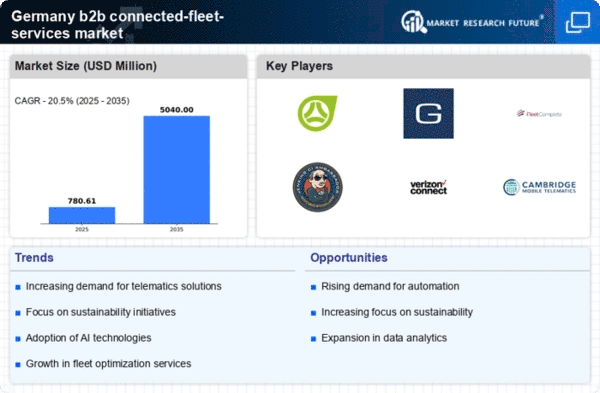Rising Demand for Fleet Optimization
The b2b connected-fleet-services market in Germany is experiencing a notable surge in demand for fleet optimization solutions. Companies are increasingly seeking ways to enhance operational efficiency and reduce costs. This trend is driven by the need to manage rising fuel prices and maintenance expenses. According to recent data, businesses that implement connected fleet services can achieve up to 20% savings in operational costs. The integration of real-time data analytics allows fleet managers to make informed decisions, leading to improved route planning and resource allocation. As a result, the b2b connected-fleet-services market is likely to expand as more organizations recognize the value of optimizing their fleet operations.
Shift Towards Data-Driven Decision Making
The shift towards data-driven decision making is significantly influencing the b2b connected-fleet-services market in Germany. Organizations are increasingly leveraging data analytics to gain insights into fleet performance and operational efficiency. This trend is supported by the growing availability of big data and advanced analytics tools. Companies that utilize data-driven strategies can enhance their decision-making processes, leading to improved fleet management outcomes. For example, businesses that analyze driver behavior data can implement targeted training programs, resulting in a potential reduction of accidents by up to 15%. As data becomes a central component of fleet management, the b2b connected-fleet-services market is likely to expand as more companies recognize the benefits of data utilization.
Regulatory Compliance and Safety Standards
Regulatory compliance is a critical driver for the b2b connected-fleet-services market in Germany. The government has implemented stringent regulations aimed at improving road safety and reducing emissions. Companies are compelled to adopt connected fleet solutions to ensure compliance with these regulations. For instance, the EU's Mobility Package mandates the use of digital tachographs and electronic logging devices, which are integral to connected fleet services. This regulatory landscape is likely to propel the adoption of advanced fleet management technologies. As businesses strive to meet compliance requirements, the b2b connected-fleet-services market is expected to witness significant growth, with an emphasis on safety and environmental sustainability.
Technological Advancements in Connectivity
Technological advancements are playing a pivotal role in shaping the b2b connected-fleet-services market in Germany. The proliferation of IoT devices and 5G connectivity is enabling seamless communication between vehicles and fleet management systems. This connectivity facilitates real-time monitoring of vehicle performance, driver behavior, and maintenance needs. As a result, companies can proactively address issues before they escalate, thereby reducing downtime and enhancing productivity. The market is projected to grow as businesses increasingly adopt these technologies to stay competitive. Furthermore, the integration of AI and machine learning into fleet management systems is expected to enhance predictive maintenance capabilities, further driving the growth of the b2b connected-fleet-services market.
Increased Focus on Sustainability Initiatives
Sustainability initiatives are becoming increasingly important in the b2b connected-fleet-services market in Germany. Companies are under pressure to reduce their carbon footprint and adopt environmentally friendly practices. This has led to a growing interest in electric and hybrid vehicles, as well as alternative fuel options. The German government is actively promoting the use of green technologies through incentives and subsidies, which is likely to drive the adoption of connected fleet services that support sustainable practices. As organizations strive to meet their sustainability goals, the b2b connected-fleet-services market is expected to grow, with a focus on reducing emissions and enhancing energy efficiency.
















